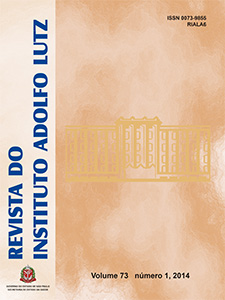Abstract
Toxoplasmosis is a protozoiasis that affects a variety of warm-blooded animals and its etiologic agent is the protozoan Toxoplasma gondii, an obligatory intracellular parasite. Among the great diversity of susceptible animals, felines have an important role in the dissemination of T. gondii infection because they are the unique definitive hosts of this parasite. In order to verify the occurrence of T. gondii infection in domestic cats in micro-Santa Maria, RS-Brazil, 180 serum samples were collected from cats examined at the Veterinary Teaching Hospital - UFSM. These samples were tested in the Laboratory of Parasitic Diseases for detecting anti-T. gondii antibodies by indirect immunofluorescence assay (IIF ) . Of 180 samples, in 39 (21.6 %) were detected anti-T. gondii antibodies, reactive in titers equal or higher than 64. This study demonstrates the high prevalence of antibody-positive felines, suggesting the participation of these animals in environmental contamination, and indicates their importance in the epidemiology of the disease.References
1. Tenter AM, Heckeroth AR, Weiss LM. Toxoplasma gondii: from animals to humans. Int J Parasitol.2000;30(2):217-20. Disponível em: [http://www.sciencedirect.com/science/article/pii/S0020751900001247].
2. Dubey JP, Rollor EA, Smith K, Kwok OCH, Thulliez P. Low seroprevalence of Toxoplasma gondii in feral pigs from a remote island lacking cats. J Parasitol. 1997;83(5):839-41. Disponível em [http://www.jstor.org/stable/3284277].
3. Frenkel JK. Toxoplasmosis: parasite, life cycle, pathology and immunology. In: Hammond DM, Long PL. The Coccidia: Eimeria, Isospora, Toxoplasma and related genera. Baltimore: University Park Press; 1973.p.343-410.
4. Lin MH, Chen TC, Kuo TT, Tseng CC, Tseng CP. Real-Time PCR for Quantitative Detection of Toxoplasma gondii. J Clin Microbiol.2000;38(11):4121-5. Disponível em: [http://jcm.asm.org/content/38/11/4121.full].
5. Langoni H, Silva AV, Cabral KG, Cunha ELP, Cutolo AA. Prevalência de toxoplasmose em gatos dos Estados de São Paulo e Paraná. Br J Vet Res Anim Sci.2001;38(5):243-4 Disponível em: [http://www.scielo.br/pdf/bjvras/v38n5/9715.pdf ].
6. Pinto LD, Araujo FAP, Stobb NS, Marques SMT. Soroepidemiologia de Toxoplasma gondii em gatos domiciliados atendidos em clínicas particulares de Porto Alegre, RS, Brasil. Cienc Rural.2009;39(8):2464-9. Disponível em: [http://www.scielo.br/pdf/cr/v39n8/a313cr1636.pdf ].
7. Araujo FAP, Silva NRS, Olicheski AT, Beck C, Rodrigues RJD, Fialho CG. Anticorpos para Toxoplasma gondii em soro de gatos internados no hospital de Clínicas Veterinárias da UFRGS, Porto Alegre, RS, Brasil, detectados através da técnica de hemaglutinação indireta. Act Sci Vet.2003;31(2):89-92. Disponível em: [http://hdl.handle.net/10183/19811].
8. Dubey JP, Navarro IT, Sreekumar C, Dahl E, Freire RL, Kawabata HH, et al. Toxoplasma gondii infections in cats from Paraná, Brazil: Seroprevalence, tissue distribution, and biologic and genetic characterization of isolates. J Parasitol. 2004;90(4):721-26. Disponível em: [http://www.journalofparasitology.org/doi/pdf/10.1645/GE-382R].
9. Garcia JL, Navarro IT, Ogawa L, Oliveira RC. Soroepidemiologia da toxoplasmose em gatos e cães de propriedades rurais do município de Jaguapitã, estado do Paraná, Brasil. Cienc Rural.1999;29(1):99-104. Disponível em [http://www.scielo.br/scielo.php?script=sci_arttext&pid=S0103-84781999000100018&lng=pt&nrm=iso].

This work is licensed under a Creative Commons Attribution 4.0 International License.
Copyright (c) 2015 Instituto Adolfo Lutz Journal
